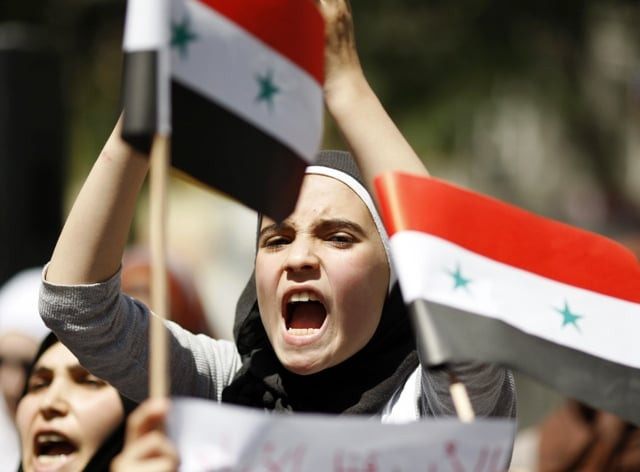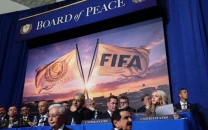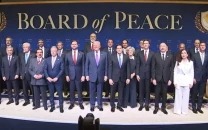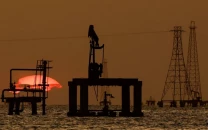Key events of 2011: Arab Spring, Bin Laden's death and economic meltdown
A month by month round up of world events.

Key events of 2011: Arab Spring, Bin Laden's death and economic meltdown
- January 14: Confronted with a massive popular movement which unleashes unrest across the Arab world, Tunisia's authoritarian president Zine el Abidine Ben Ali flees the country after 23 years in power.
- February 11: In Egypt, with massive crowds filling Cairo's central Tahrir Square, Hosni Mubarak becomes the next Arab leader to step down, and hands over power to the military. Nearly 850 civilians are killed in the revolt.
- February 14: The latest country to join what is dubbed the Arab Spring, Bahrain sees protests calling for political reforms. Saudi Arabia sends troops, and the protests are crushed by mid-March. Around 30 people die during the repression.
- February 15-16: A rebellion erupts in Benghazi, Libya's second-biggest city, against the 42-year-old regime of Muammar Qaddafi. On March 19, French, US and British forces launch UN-mandated air strikes, before handing over command to Nato on March 31. The opposition creates the National Transitional Council, which is recognised by the UN and over 60 countries.
- February 22: In New Zealand's city of Christchurch a devastating 6.3 magnitude earthquake kills over 200 people.
- February 26: Irish Prime Minister Brian Cowen becomes the first political victim of the financial crisis rattling the eurozone after his ruling Fianna Fail party is crushed by voters angry over the economy and an EU-IMF bailout. He is followed out of office in March by Portuguese premier Jose Socrates.
- March 11: A massive earthquake and tsunami devastates northeastern Japan, leaving 20,000 people dead or missing and unleashing a nuclear crisis at the Fukushima plant, the worst since the 1986 Chernobyl disaster.
- March 15: Syria becomes the next Arab country to face popular protests, which are heavily put down by the security forces. More than 5,000 people die in months of unrest, according to the UN. The regime of President Bashar alAssad faces international pressure over the repression.
- April 11: Troops loyal to Ivory Coast leader Alassane Ouattara capture his besieged rival Laurent Gbagbo in Abidjan after a disputed election. In November Gbagbo is transferred to the International Criminal Court.
- April 29: Britain's Prince William and his bride Kate Middleton marry with huge crowds and a global TV audience watching Britain's biggest royal celebration for three decades. They become the Duke and Duchess of Cambridge.
- May 1: The Vatican confers "blessed" status, one step from full sainthood, on the late pope John Paul II at a solemn ceremony.
- May 2: Al Qaeda chief Osama bin Laden, believed responsible for the September 11, 2001 attacks on the United States, is shot dead by US commandos in Pakistan after a 10-year manhunt.
- May 6: In Ivory Coast, Ouattara, who won the disputed October-November election, is sworn in as president, promising national reconciliation. According to the new authorities the violence that followed the November 2010 election cost 3,000 lives.
- May 14: IMF chief Dominique Strauss-Kahn resigns and faces trial after being accused of a sexual assault on a maid in his hotel suite in New York. The charges are later dismissed, but his ambitions of becoming French president are ruined.
- May 17: The start of anti-capitalism demonstrations in Spain. They spread to Britain and the United States via Chile, with tens of thousands demonstrating around the world on October 15.
- May 26: Serbia arrests Europe's most wanted man, Bosnian Serb wartime army commander Ratko Mladic. He is transferred to the UN's Yugoslavia warcrimes court in The Hague.
- June 22: US President Barack Obama decides to bring 33,000 troops home from Afghanistan by mid-2012. On July 17, Afghanistan begins handing responsibility for security from NATO soldiers to its own troops.
- July 9: South Sudan proclaims independence after a January referendum in which almost 99 percent voted in favour of secession. The new country becomes the UN's 193rd member state.
- July 21: The US space shuttle Atlantis cruises home for a final time, closing a 30-year chapter in American space exploration, in which two shuttles, Challenger and Columbia were lost in accidents with the death of 14 astronauts.
- July 22: 77 people are killed in a massive twin bombing and shooting spree by right-wing extremist Anders Behring Breivik in Norway. He is later judged insane.
- August 2: After a weeks-long battle, the US Congress agrees on a massive austerity plan and raising the US debt ceiling. On August 6, Standard and Poor's cuts the US credit rating from its top-flight triple-A for the first time in history, amid concerns over the country's deficit and debt.
- August 4: The police shooting of a 29-year-old black man in Tottenham, north London provokes rioting in the capital and across England. Five people are killed and hundreds of shops looted, some set alight.
- September 20: Burhanuddin Rabbani, Afghanistan's former president tasked with finding a peace deal with the Taliban, is assassinated in a suicide attack.
- October 7: Liberian President Ellen Johnson Sirleaf, Liberian "peace warrior" Leymah Gbowee, and Yemen's Arab Spring activist Tawakkul Karman win the Nobel Peace Prize.
- October 20: Toppled Libyan leader Qaddafi is killed after forces loyal to the country's new rulers seize his hometown of Sirte after a seven-month-long campaign. On October 23, the new rulers declare that Libya has been liberated.
On December 16, the UN and the United States lift most of their sanctions on Libya.
- October 23: More than 600 die in a 7.2 magnitude earthquake in eastern Turkey.
- October 23: The moderate Islamists of the Ennahda party win 89 of the 217 seats in Tunisia's new constituent assembly.
- October 27: European Union leaders reach a ground-breaking deal to save the bloc's single currency, including a new rescue of Greece, a trillion-euro bailout fund, and a deal squeezing banks to share the burden of the two-year debt crisis.
- October 31: Palestinians win entry to UNESCO.
- October 31: The world's population passes the seven billion mark.
- November 7: Michael Jackson's doctor Conrad Murray is found guilty of involuntary manslaughter over the King of Pop's 2009 death. He is later sentenced to a maximum four years behind bars.
- November 8: The UN atomic watchdog says it has "serious concerns" about Iran's nuclear activities, and has "credible" information Tehran may have worked on developing atomic weapons, prompting the West to reinforce sanctions against the Islamic republic.
- November 9: Greek Socialist Prime Minister George Papandreou stand downs after sparking chaos in the EU with his plan for a referendum on the October 27 economic rescue deal, which is quickly dropped. He is succeeded by vice-president of the European Central Bank, Lucas Papademos.
- November 12: Silvio Berlusconi becomes the latest leader to lose his job over the eurozone financial crisis, resigning amid Italy's 1.9 trillion euro debt burden. He is replaced by technocrat Mario Monti, who vows to balance the budget by 2013.
- November: The death toll from Thailand's worst floods in decades jumps to at least 666. The floods damage millions of homes and livelihoods.
- November 23: In another development in the Arab Spring, after months of deadly clashes, Yemeni President Ali Abdullah Saleh signs a deal to hand over his powers after 33 years in office. On December 10, a national unity government is sworn in. Hundreds have been killed in the protests.
- November 25: A moderate Islamist party wins the most seats in Morocco's parliamentary elections.
- November 28-29: Egypt holds its first post-revolution election in Cairo and the port city Alexandria. The polls take place after a week of protests calling for the resignation of the interim military rulers, in which 42 people are killed. Islamists take an early lead in the elections, a lead confirmed in the second phase held on December 14-15, amid a new wave of deadly violence.
- November 29: Britain's embassy in Tehran is attacked by protesters angry at fresh sanctions against Tehran's nuclear programme. Britain expels Iranian diplomats and shuts its embassy in response.
- December 4: In Russia, legislative elections see the ruling United Russia party of Prime Minister Vladimir Putin narrowly retain its majority despite allegations of widespread voter irregularities, unleashing popular protests not seen since the 1990s.
- December 9: EU leaders back tighter budget policing in desperate efforts to save the eurozone, but Britain vetoes a new EU treaty.
- December 16: In the southern Philippines, mammoth floods unleashed by tropical storm Washi leave at least 1,249 dead or missing.
- December 17: North Korean leader Kim Jong-Il dies aged 69 of a heart attack as Pyongyang urges people to rally behind Kim's youngest son Jong-Un.
- December 18: The last US forces leave Iraq nearly nine years after launching a divisive war to oust Saddam Hussein.
- December 19: Syria, suspended in November from the Arab League, agrees to allow an observer mission to monitor a deal to end nine months of bloodshed. The massacres go on, with 123 civilians killed on December 20. On the 27 the observers visit the flashpoint city of Homs a day after dozens of people were killed in the crackdown.



















COMMENTS
Comments are moderated and generally will be posted if they are on-topic and not abusive.
For more information, please see our Comments FAQ